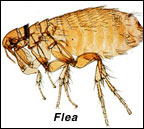
PARASITE CONTROL
Parasites are either intestinal or, external requiring specific/targeted prevention depending on your pet’s lifestyle and, your families’ plans for traveling with your pet.
Many people expect to see “worms” in their pet’s stool indicating their pet has become infested with parasites-however this is unusual and, can be indicative of a more severe illness. The only certain method to diagnose intestinal parasite infestation is through the use of fecal testing. Sunnyview Animal Care recommends annual fecal tests regardless of the use of preventatives, & two fecal tests for kittens & puppies 1-month apart. There are some concerns for intestinal parasites transferring illness from dogs or cats to people.
Similarly, many clients expect to see fleas or other external skin parasites on their pets. With the exception of an engorged tick, fleas & or ticks & are either so small that they can evade detection depending on the specific parasite!
As part of your pet’s annual Wellness Assessment, the veterinarian’s at Sunnyview Animal Care will evaluate & advise you on your pet’s parasite control needs.
FECAL TESTING
Unlike the external parasites seen on our pets like fleas & ticks, most intestinal parasites produce microscopic eggs that are missed by our clients. The only effective manner used to find them is to perform a microscopic fecal test.
Obtaining a fecal sample is an integral part of your pet’s complete Annual “Wellness” Examination



